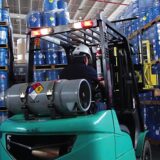CLGS: The Fastest Way to Identify a Grease Expert
 KANSAS CITY, MO – In the world of maintenance and lubrication, several lubricant-related technical organizations now certify lubrication expertise. These include the International Council for Machinery Lubrication (ICML), the Society of Tribologists & Lubrication Engineers (STLE), and NLGI International. Each has an established program that documents the major criteria for demonstrating knowledge and skill in lubricants and lubrication practices. But only NLGI’s Certified Lubrication Grease Specialist program identifies those individuals who have true expertise in lubricating grease. The letters CLGS after one’s name signify both fundamental and extended knowledge of grease formulations, grease processing, grease testing and grease applications.
KANSAS CITY, MO – In the world of maintenance and lubrication, several lubricant-related technical organizations now certify lubrication expertise. These include the International Council for Machinery Lubrication (ICML), the Society of Tribologists & Lubrication Engineers (STLE), and NLGI International. Each has an established program that documents the major criteria for demonstrating knowledge and skill in lubricants and lubrication practices. But only NLGI’s Certified Lubrication Grease Specialist program identifies those individuals who have true expertise in lubricating grease. The letters CLGS after one’s name signify both fundamental and extended knowledge of grease formulations, grease processing, grease testing and grease applications.
This is important because grease doesn’t behave like other lubricants. It typically is produced in a sophisticated reaction process (not simply blended like other lubricants), and it requires unique understanding to correctly formulate, test, select and apply. “While the other programs focus primarily on fluid lubrication but include some lubricating grease fundamentals, the NLGI’s Certified Lubricating Grease Specialist program deals almost exclusively with lubricating grease,” observes Terry Smith, director of environmental, safety and lab support at Lubrication Engineers.
Smith, who is also a member of the NLGI Board of Directors, knows this first-hand. He holds credentials from all three of the groups, and says having the letters “CLGS” on one’s business card sends a message the others don’t: It says the individual possesses a defined level of expertise that is specific to the field of grease, and that NLGI recognizes this achievement.
“Certification entitles one to use the copyrighted CLGS designation, and to be listed on the NLGI website as a grease expert,” he points out. “It can be a professional advantage in obtaining employment or going after business opportunities that require grease expertise, and it brings immediate credibility when working with customers. Employers use CLGS certification to screen potential employees, and OEMs and end users can use it to ensure that their suppliers are qualified to make grease recommendations.”
Obtaining CLGS begins with a closely monitored two-hour written examination. An 80 percent or better score is required for successful certification, which extends for a three-year period. To maintain certification, the candidate must every three years either retake the exam or submit documentation to NLGI of continuing professional development, such as:
•Attending an NLGI annual meeting
•Presenting a paper at an NLGI annual meeting
•Publishing a grease-related paper in an industry periodical
•Attending the ELGI or NLGI-India Chapter meeting
•Presenting a grease-related paper or teaching a training seminar at an industry meeting
The CLGS exam will be given during NLGI’s Annual Meeting on June 18th, 2013, at 2:00PM in Tucson, AZ. NLGI also offers and array of reference guides and education to help individuals achieve this important professional goal. For more information, visit NLGI’s website at www.nlgi.org. (January 24, 2013)










